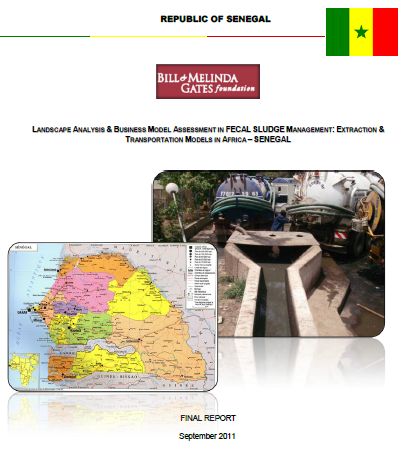Landscape analysis & business model assessment in fecal sludge management: extraction & transportation models in Africa – Senegal
Mbeguere, M., Gning, J. B., Toure, F., Diop, B., Toure, S., Fam, A. (2011)

Published in: 2011
Publisher:
Consultancy report by H2O Engineering commissioned by Bill & Melinda Gates Foundation, Seattle, USA
Author:
Mbeguere, M., Gning, J. B., Toure, F., Diop, B., Toure, S., Fam, A.
Uploaded by:
SuSanA secretariat
Partner profile:
common upload
6658 Views
225 Downloads
Location of library entry
Content - Summary
In general, fecal sludge management can be considered the weak point in sanitation because raw sludge is disposed of illegally. However, meetings have taken place between decision-makers and sludge operators throughout the country in order to discuss the problem and find sustainable solutions for the improvement of the sector.
In recent years, fecal sludge management has become a major concern for city authorities in developing countries and institutions working in the field, and significant investments have been made. These include the construction of individual systems for the pre-collection and dumping of sludge. The Sanitation Program for Peri-urban Regions of Dakar (PAQPUD) as well as the present study, ”Landscape Analysis and Business Model Assessment in Fecal Sludge Management, Extraction and Transportation in Three Cities of Senegal (Dakar, Thiès and Touba)” commissioned by the Bill and Melinda Gates Foundation, are inspiring examples. These three cities, different in many respects, were chosen for a comparative analysis to efficiently identify all aspects of fecal management at the three sites.
Fecal sludge management takes into account the discharge, treatment and re-use or disposal of effluent and solids (bio-solids). For now, the informal sector constitutes the entire chain apart from the treatment of sludge. This treatment, however, is the only way to remove health and environmental hazards (by eliminating pathogens, concentrating sludge in an impermeable location and the discharge of treated effluent). The re-use of biosolids can be made possible through the production of a compost which is no longer a danger to public health.
On conclusion of this study, we find that the sludge management sector is characterized by the involvement of several actors: the State (through ONAS and its bodies); private operators (sludge management business chiefs and manual and mechanical desludging operators); NGOs; research institutes; and the public. However, even if it is easy to identify the industry stakeholders, the fact remains that it is a disorganized sector.
The evolution and ongoing experience of fecal sludge management in Senegal are largely the result of work by NGOs such as ENDA and CREPA. These organizations support the population through training sessions, and awareness-raising activities. Even more importantly, they finance private and/or community initiatives for the management of fecal sludge.
Local populations are the core of the fecal sludge management system. Indeed they are the primarily producers of sludge, ensure its storage and pay for its disposal. Thus this category of stakeholder deserves to be taken into account. Despite this centrality, it is the people who suffer the high costs of desludging. 26 % of household heads surveyed chose manual desludging as they could not afford to use mechanical desludging services. Hence the need for a harmonized pricing and concerted pricing system for all stakeholders, but especially for the local populations.
The results obtained in Senegal in relation to fecal sludge management are tangible, but in order to attain the MDGs in terms of sanitation, certain recommendations should be implemented so as to strengthen these achievements.
Corresponding author:
Francoise Touré
francoise.toure@cabinetede.com
Bibliographic information
Mbeguere, M., Gning, J. B., Toure, F., Diop, B., Toure, S., Fam, A. (2011). Landscape analysis & business model assessment in fecal sludge management: extraction & transportation models in Africa – Senegal. Consultancy report by H2O Engineering commissioned by Bill & Melinda Gates Foundation, Seattle, USA
Filter tags
English Faecal sludge treatment processes Fundamental research and engineering Peri-urban Sub-Saharan Africa














